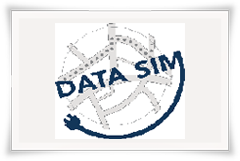Welcome to InfoLab
Information Management (IM) is primarily concerned with the capture, digitization, representation, organization, transformation, and presentation of information; algorithms for efficient and effective access and updating of stored information, data modeling and abstraction, and physical file storage techniques” (source: ACM/IEEE-CS Joint Task Force, Computer Science Curricula 2013). The Information Management Lab (InfoLab), established in 2002, serves teaching and research in various IM fields, with a special research focus on location and mobility information.
Recent News
- Nov. 12, 2013: Best Paper Award at ER 2013 conference for the paper “Baquara: A Holistic Ontological Framework for Movement Analysis using Linked Data” by Renato Fileto, Marcelo Krüger, Nikos Pelekis, Yannis Theodoridis, Chiara Renso.
- Sep. 3, 2013: Our paper “Semantic trajectories modeling and analysis” (co-authored by colleagues at Univ. Lausanne, EPFL, CNR, Fraunhofer, UFSC, Univ. Milan, IBM Zurich, and FUC) was published in the prestigious ACM Computing Surveys, top-ranked journal in Computer Science (5-years impact factor: 6.7). DOI: 10.1145/2501654.2501656.
- Feb. 14, 2013: Stylianos Sideridis graduated 1st in his class! Congratulations!
- Nov. 27, 2012: Nikos Giatrakos successfully defensed his PhD thesis today. Congratulations!
- Oct. 11, 2012: InfoLab successfully co-organized the 16th Panhellenic Conference on Informatics (PCI), which was hosted this year by the Univ. Piraeus. For more information about the conference, please visit: http://pci2012.unipi.gr.
- Dec. 19, 2011: InfoLab press release – Successful kick-off European FP7 project DATASIM.
- Nov. 1, 2011: InfoLab participates in DATASIM (DATa science for SIMulating the era of electric vehicles), a new European FP7/ICT project. During this project, InfoLab plans to work on semantic-aware mobility data management and mining, towards the BIG DATA era.
- Oct. 24, 2011: InfoLab co-organizes the 2012 edition of the Panhellenic Conference on Informatics (PCI), the main annual event of the Greek Computer Society. PCI’2012 will take place at the University of Piraeus in October 2012. Stay tuned.
- Sep. 12, 2011: A successful ECML PKDD conference, co-organized by InfoLab, is over. For more news, please check the conference web site and our newsletter.
- Jan. 17, 2011: The recent (December 2010) issue of MODAP newsletter is devoted to InfoLab. The full pdf is available here. An updated feedback from Mr. Vasilis Zorkadis, Hellenic Data Protection Authority, is also available here.
- Apr. 14, 2010: Evangelos Kotsifakos successfully defensed his PhD thesis today. Congratulations!
- Dec. 21, 2009: Gerasimos Marketos successfully defensed his PhD thesis today. Congratulations!
- Nov. 1, 2009: Our paper “Clustering Trajectories of Moving Objects in an Uncertain World” has been selected for the “Best application paper” award at the ICDM09 conference!
- Apr. 29, 2009: Dr. Nikos Pelekis, member of our lab, was recently elected Faculty member (Lecturer level) at the Dept of Statistics, Univ. Piraeus. Niko, congratulations!
- Mar. 13, 2009: New diploma theses proposals have been announced here (in greek]
- Mar. 9, 2009: Our lab has been selected to develop a localization of MySQL Workbench, funded by ELLAK. [More info – in greek]
- Sep. 24, 2008: Elias Frentzos has successfully defensed his PhD thesis. Elia, congratulations!







